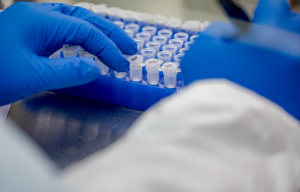
During their 5 p.m. Friday update, the Pennsylvania Department of Health released that a third patient has COVID-19 in Bucks County.
The new patient was an adult who came in contact with a a Children’s Hospital of Philadelphia (CHOP) doctor who worked at a facility in King of Prussia, Montgomery County, and tested positive earlier this week for COVID-19, officials said.
As of Friday evening, there were no confirmed cases of community spread in Bucks County.
On Tuesday, Bucks County’s first two COVID-19 cases were confirmed. The first two patients live together and are in isolation. They were reported to have minor symptoms from COVID-19, also known as the novel coronavirus, and are expected to recover. The two caught the virus at an out-of-state gathering, officials said.
Bucks County plans to not release the ages and hometowns of COVID-19 cases.
In addition to the three positive cases, several residents are self-isolated and are being monitored across the county.
As of 5 p.m., there were 41 total COVID-19 cases in the state. The county-by-county breakdown is below:
- Bucks (3)
- Chester (1)
- Cumberland (3)
- Delaware (6)
- Monroe (3)
- Montgomery (18)
- Northampton (1)
- Philadelphia (3)
- Pike (1)
- Washington (1)
- Wayne (1)
MORE INFO: Bucks County Declares Emergency & All Schools To Close For Two Weeks
Below are frequently asked questions provided by state health officials:
What is coronavirus?
Coronaviruses are a large family of viruses, some causing illness in people and others circulating among animals, including camels, cats and bats.
The 2019 novel coronavirus (COVID-19) is a new virus that causes respiratory illness in people and can spread from person-to-person. This virus was first identified during an investigation into an outbreak in Wuhan, China.
What are the symptoms of coronavirus?
Symptoms of COVID-19 can include:
- Fever
- Cough
- Shortness of breath
The symptoms may appear in as few as two days or as long as 14 days after exposure. Reported illnesses have ranged from people with little to no symptoms to people being severely ill and dying.
How can the coronavirus spread?
Human coronaviruses spread just like the flu or a cold:
- Through the air by coughing or sneezing;
- Close personal contact, such as touching or shaking hands;
- Touching an object or surface with the virus on it;
- Occasionally, fecal contamination.
How can I help protect myself?
Prevention:
- Cover coughs or sneezes with your elbow. Do not use your hands!
- Wash hands often with soap and water for at least 20 seconds. Use an alcohol-based hand sanitizer if soap and water are not available.
- Clean surfaces frequently, including countertops, light switches, cell phones, remotes, and other frequently touched items.
- Contain: if you are sick, stay home until you are feeling better.
In addition, it is recommended that Pennsylvanians take time to prepare now. View the PA Emergency Preparedness Guide.
Should I wear a mask or respirator in public?
The CDC does not recommend wearing masks or respirators outside of workplaces settings (in the community). A respirator is a personal protective device that is worn on the face or head and covers at least the nose and mouth. Most often, spread of respiratory viruses from person-to-person happens among close contacts (within 6 feet). It is important that these devices are readily available to health care workers and others who need them.
Should I cancel my trip to a country with a level 3 travel advisory?
Yes. The CDC recommends travelers avoid all nonessential travel to countries with a level 3 travel advisory at this time. For more travel information, visit our Travelers Page.
Should I cancel my international travel because of novel coronavirus?
The CDC recommends avoiding all nonessential travel to a country with a level 3 travel advisory. For travel advice for other countries, please visit that country’s Destination PageOpens In A New Window or Travel Health NoticesOpens In A New Window page on the CDC’s website.
What about animals or animal products imported from China?
The CDC does not have evidence to suggest that animals or animal products imported from China pose a risk for spreading COVID-19 in the United States. This is a rapidly evolving situation and information will be updated as it becomes available.








